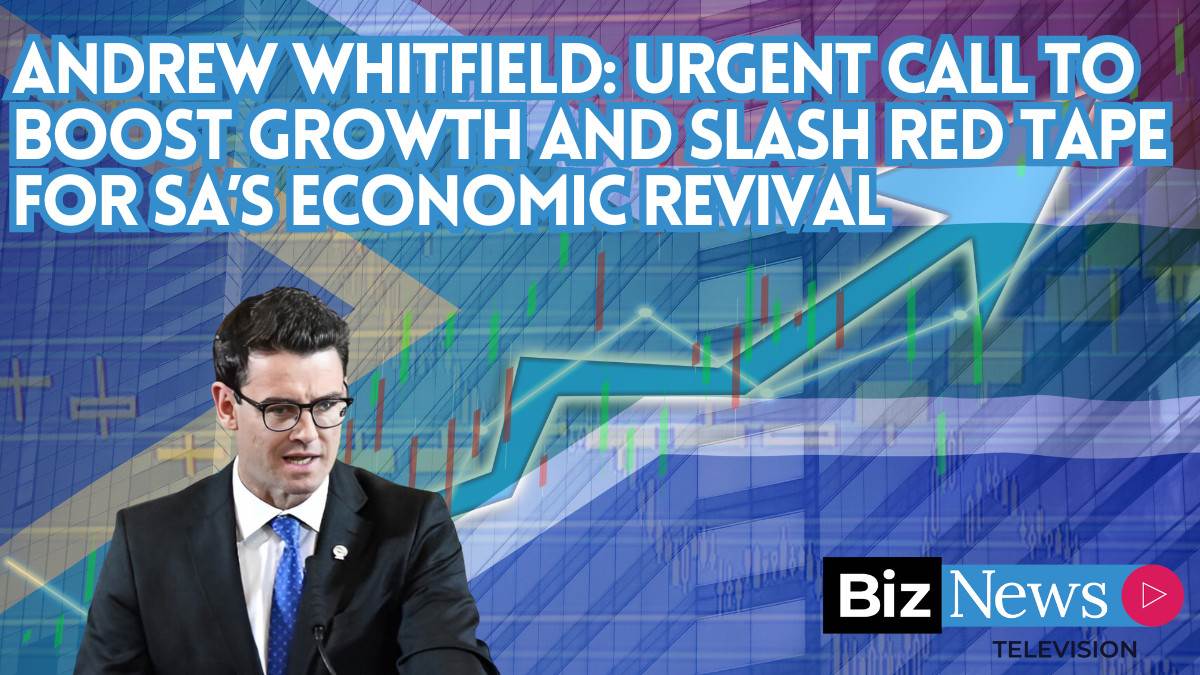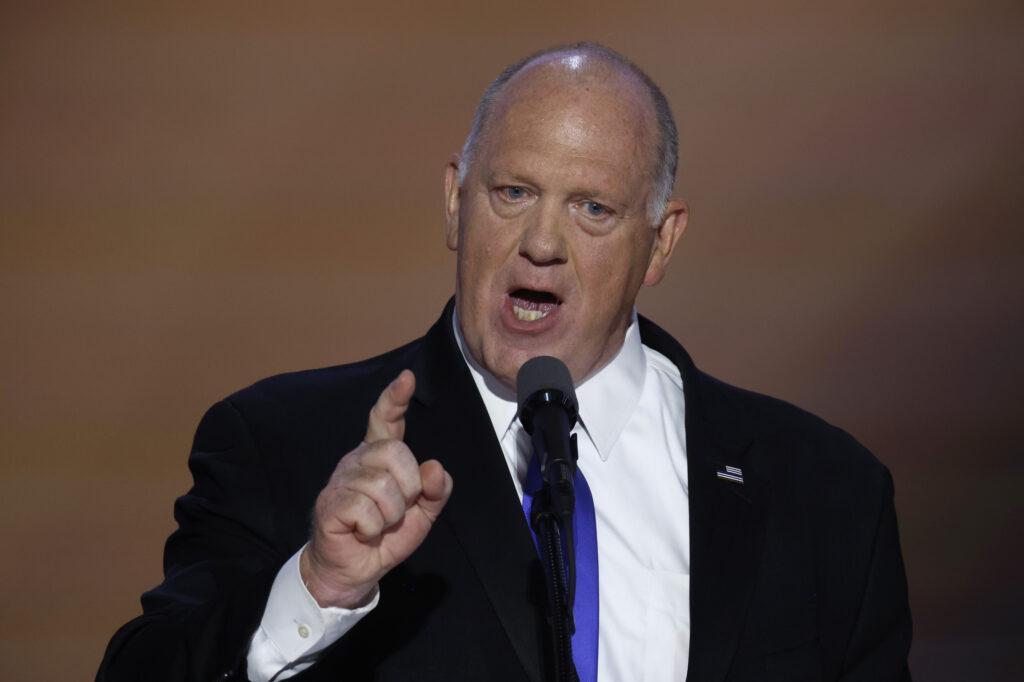Deputy Trade Minister Andrew Whitfield: AGOA renewal, slashing red tape and SA’s economic revival

Top Stories Tamfitronics
In a BizNews interview, Deputy Minister Andrew Whitfield shared his vision for revitalizing South Africa’s economy and enhancing its relationship with the United States through the African Growth and Opportunity Act (AGOA). Emphasizing the critical need for data-driven policies and robust intergovernmental collaboration, Whitfield discussed the importance of addressing inefficiencies and fostering private sector partnerships. His strategic approach aims to transform economic growth and job creation, making South Africa a more attractive destination for investment. The interview provides an insightful look into the government’s plans to leverage AGOA’s benefits while tackling pressing economic challenges.
Sign up for your early morning brew of the BizNews Insider to keep you up to speed with the content that matters. The newsletter will land in your inbox at 5:30am weekdays. Registerhere.
Join us for BizNews’ first investment-focused conference on Thursday, 12 September, in Hermanus, featuring top experts like Frans Cronje, Piet Viljoen, and more. Get insights on electricity and exploiting SA’s gas bounty from new and familiar faces. Registerhere.
Watch here
Listen here
Highlights from the Interview
In this BizNews interview, Deputy Minister Andrew Whitfield discussed the South African government’s approach to economic revitalization and its relationship with the United States, focusing on the African Growth and Opportunity Act (AGOA). Whitfield highlighted the need for a data-driven approach to policymaking, emphasizing that decisions should be based on evidence rather than emotion or ideology. He acknowledged the challenges posed by inefficiencies in government processes, such as lengthy merger approvals, and stressed the importance of improving these processes to boost South Africa’s attractiveness to investors.
Whitfield also addressed the significance of collaboration between government departments and the private sector to overcome economic constraints. He noted the ongoing discussions and the need for a mature, respectful approach to policy disagreements within the government of national unity. Despite the complexities, Whitfield expressed his commitment to ensuring effective decision-making and accountability. He underscored the urgency of demonstrating tangible results in growth and job creation, particularly with local elections approaching. The interview reveals Whitfield’s strategic vision for leveraging AGOA to foster economic development and enhance South Africa’s global standing.
Edited transcript of the Interview
00:00:11:15 – 00:00:44:19
Bronwyn Nielsen: With me, the Deputy Minister of Trade, Industry, and Competition, Andrew Whitfield. Having just returned from Washington, where you were negotiating with regards to the Africa Growth and Opportunities Act, AGOA as we all know it, and, Andrew, I’ve seen you quoted a couple of times across media platforms saying that you left with a good feeling. You don’t have details of a renewal in terms of the proposed 16 years.
00:00:44:21 – 00:00:52:18
Bronwyn Nielsen: But let me hand to you at this stage in terms of where, what, why, when, and who in terms of AGOA.
00:00:52:20 – 00:01:13:02
Andrew Whitfield: Yes. Well, I did leave with a positive feeling and I think we left a positive feeling behind, which is also, I think, the more important part of the mission. South Africa has had a difficult time in the United States and in Washington over a number of years, and I think that the sentiment last week was incredibly positive, more positive than it’s probably been in a very long time for a couple of reasons.
00:01:13:12 – 00:01:38:00
Andrew Whitfield: And I’ll come to those in a second. But you’re absolutely right. We didn’t get to negotiate the details of some of the changes that we’d like to see. The 16-year renewal period. Although there were some positive responses around that. We know that Senator Chris Coons has made some remarks in that regard. We know that the African trade ministers were singing the same hymn in that regard.
00:01:38:05 – 00:01:57:11
Andrew Whitfield: And a large part of that is to create certainty for the business environment. A lot of, for example, textiles, planning cycles are way beyond a year. And so the anxiety around this particular renewal and the desire for an early renewal was very the message was very strongly seen by a number of African states in Washington.
00:01:57:12 – 00:02:16:22
Andrew Whitfield: So we had a very good diplomatic trade mission, if I can call it that, from the point of view of rebuilding relationships in Washington. And the minister was very clear that we have had an opportunity to reset a new government in South Africa, which presents a new opportunity to rebuild our relationships in Washington.
00:02:17:00 – 00:02:23:21
Bronwyn Nielsen: Deputy Minister, did you feel warmly received that we firmly, as South Africa, have a seat at the table?
00:02:23:23 – 00:03:02:19
Andrew Whitfield: Yes, absolutely. I think that one of the things people overlook, they look at the reasons why the United States wants to or some in the United States want to exclude us from AGOA. You know, the security concerns, foreign policy concerns, whatever the case may be. But a key component of AGOA is democracy. And South Africa demonstrates the remarkable resilience of our people, our institutions, and the majority of our political parties finding common ground, coming together and establishing a new government in new circumstances where a majority party, for the first time in a very long time in South Africa, had fallen below 50%.
00:03:02:21 – 00:03:23:12
Andrew Whitfield: And I think that is incredibly significant. And that was a very positive feeling that I think was left behind in Washington. So we were warmly received on that basis. There were engagements where issues around foreign policy were raised, not to the extent that we expected them to be. We aren’t under the Department of International Relations. We are the Department of Trade.
00:03:23:12 – 00:03:34:02
Andrew Whitfield: And so we tried to keep the conversations very much focused on the trade relationship and how that can benefit both of our countries. And so that was the key emphasis in the message in Washington.
00:03:34:04 – 00:04:07:22
Bronwyn Nielsen: The expiry is, of course, 2025. And there will be huge implications for farmers in particular if we don’t see a renewal. Now, I know that there is not much detail to share at this juncture. And of course, we have a US election that is going to sidetrack attention. But when is the next meeting and what visibility do you have, at least on that roadmap in terms of meeting again and sitting around the table?
00:04:08:00 – 00:04:44:15
Andrew Whitfield: Well, we can’t trade on sentiment alone. And as positive as it was in Washington, it’s not going to last forever. And so sentiment needs to be followed by substance, tangible deliverables, action steps, real technical discussions that need to take place. One of the positive outcomes, tangible outcomes from our visit to Washington was the reestablishment of the TIFA, which is the Trade and Investment Framework Agreement, where we are able to engage in bilateral discussions with the United States on key trade issues, blockages, technical issues, etc. And the Minister has elevated it to his level to ministerial level.
Read more: NewsWrap with Alec Hogg Ep1 – Libyans; Patricia’s freedom; Stock Rotation and plenty more…
00:04:44:17 – 00:05:06:02
Andrew Whitfield: And so we are hoping that the Minister and Ambassador Katherine Tai, the US Trade Representative, will be able to have frequent engagements through that structured platform. And the Minister has already indicated his willingness to return no later than September. And so I think that that also sends a message of urgency. Congress is in recess at the moment.
00:05:06:02 – 00:05:30:01
Andrew Whitfield: So it wouldn’t be beneficial to go too soon after our most recent visit. In September, Congress reconvenes. There will be an opportunity to engage both sides of the House. And that is the commitment that the Minister is making publicly that he is keen to return on an urgent basis to continue the discussions. And a lot of those discussions, you’re correct, are centered around agriculture.
00:05:30:03 – 00:05:54:18
Andrew Whitfield: You know, how much chicken do we bring in and whether we take pork and whether we can get aero’s arts and how much citrus we can get in. And so it is a fascinating discussion. And I described it to somebody the other day as a wonderfully complex problem to have to solve. And it’s such a dynamic space operation where we’ve got a changing global trade environment as well, which is putting pressure on a lot of these agreements and these relationships.
00:05:54:18 – 00:06:16:19
Andrew Whitfield: So I think that the minister understands the urgency and is working with urgency. The impact on the agricultural sector is absolutely front of mind. But bear in mind, I’m coming to you from Gqeberha, Nelson Mandela Bay, where the automotive sector, and just down the road in East London, we’ve got folks working in Ford here in Nelson Mandela Bay, amongst other component manufacturers, who will also feel the pressure.
00:06:16:21 – 00:06:23:04
Andrew Whitfield: And so we really are serious about sitting around the table and sorting out those issues, which may still exist.
00:06:23:08 – 00:06:28:16
Bronwyn Nielsen: Just remind us of the hard stop. Come 2025, in terms of expiry.
00:06:28:22 – 00:06:49:21
Andrew Whitfield: So as I understand it, it is September 2025, so the Minister will be hopefully returning to Washington. I can’t commit on his behalf, but certainly that’s what it sounds like, that he’ll be going in September this year, obviously pushing for an early renewal. That was one of the other key messages that the trade ministers and others said: look, we’ve got investors that need to plan.
00:06:50:01 – 00:07:09:18
Andrew Whitfield: We need to make commitments, and the framework of AGOA, and the planning cycles need to be aligned as best as possible. An early renewal would help us. We don’t know about an early renewal because there’s an election coming up. You may have heard about it, and it’s taking place in November. So that means Congress reconvenes in September.
00:07:09:18 – 00:07:27:12
Andrew Whitfield: They go on recess again to campaign for November. Congress is reestablished, I think, during the course of November. And then we go into this lame-duck period before the inauguration of a new president. And whichever way it falls, there will be a new president, whether it’s a continuation of…
00:07:27:14 – 00:07:44:09
Bronwyn Nielsen: Let’s pursue that still for a moment. Whichever way it falls in terms of the 1st of November, will there be a renewal on AGOA, or is it very dependent on who we see inaugurated as president of the United States?
00:07:44:11 – 00:08:09:16
Andrew Whitfield: So the message from Washington to all African trade ministers was that AGOA is one of those pieces of legislation that has bipartisan and bicameral support. So both in the Senate and the House of Representatives, in the Republicans and the Democrats, and that has been the case for 24 years. There were some nervous times in 2015, ten years ago, when it seemed that AGOA was coming to an end.
00:08:10:06 – 00:08:30:12
Andrew Whitfield: And I think that a lot of African states have still got some room to improve in terms of benefiting from AGOA. I think there’s some room to improve and to convince the Americans. So I think that we are in a position where we’ve got a currently strong, bicameral, bipartisan support. I think that the outcome of the election is a critical component.
00:08:30:12 – 00:08:58:04
Andrew Whitfield: I don’t think we can ignore that. We know from a previous term of office that President Trump had moved towards more desperate, more protectionist measures, isolating America from the rest of the world or attempting to do so. And that does cause concern. I don’t think many people realize how bipartisan Congress actually is. And Congress is distinctly separate from the administration in many ways.
00:08:58:06 – 00:09:13:14
Andrew Whitfield: And so we hope that that robust partnership between the administration and the White House and Congress continues, because that would bode well for us. So I can’t predict with any certainty. Let’s just say it’s reasonably volatile, reasonably volatile.
00:09:13:14 – 00:09:25:01
Bronwyn Nielsen: We’ll take that. Let’s talk about the African Continental Free Trade Area, because Minister Parks Tau emphasized the importance of AfCFTA and linking it to AGOA.
00:09:25:03 – 00:09:47:14
Andrew Whitfield: Yeah. So, I mean, one of the key discussions amongst African trade ministers, and I had the privilege of being thrown in the deep end and having to moderate a discussion with the African trade ministers around how do we harmonize AGOA and the African Continental Free Trade Area. The discussions centered around whether AGOA expands its mandate into North Africa.
00:09:47:16 – 00:10:08:19
Andrew Whitfield: Or, you know, how do we regulate this environment? How do we create the rules? And that is not a, that’s a discussion. Sorry, that’s really just the beginning. But there seem to be some good proposals on the table in terms of how we can create harmony. I think there’s a lot of anxiety around the fact that this early renewal is looking unlikely.
00:10:09:14 – 00:10:31:19
Andrew Whitfield: We’re confident that South Africa will be part of a renewal. We remain confident in spite of the electoral outcome. Obviously, there are different circumstances in which we would have to negotiate after the elections, depending on that outcome. But the issue of renewal, as far as I’m concerned, remains in place. And I think that we are in a good position at the moment.
00:10:32:01 – 00:10:54:23
Bronwyn Nielsen
Than just talking about the, the, conversation and that you said you thought you would face more of and that is Iran potentially global relations. Yeah. I’m going to go straight to the likes of Russia and China. Were there any questions asked about coziness with Russia or China?
00:10:55:01 – 00:11:19:17
Andrew Whitfield
Yes. I mean, there were questions that were raised, perhaps I was fortunate to be part of all the meetings because I arrived a day late, and I think some of the more robust engagements were with the minister the day before. But I think generally it was expected, you know, and it did come up. And the minister reaffirmed South Africa’s nonaligned position and spoke about perceptions versus reality and that the conversation does need to continue.
00:11:19:17 – 00:11:41:16
Andrew Whitfield
But we are serious about rebuilding our relationship with Washington. I think a large part of the tension in the relationship was the lack of maintenance of the relationship, clear, consistent communiques over a number of years. And I think that the United States also understands that South Africa is entitled to determine its own foreign policy as a sovereign state.
00:11:42:00 – 00:12:04:07
Andrew Whitfield
But equally, they have concerns which are built into the Agoa Act, which revolves around security issues, foreign policy issues, etc., and so I think it will be an ongoing discussion. I don’t think it’s just South Africa that has that discussion, although of late I think we’ve been the centerpiece and focus of that discussion. And as I said earlier in the interview, it wasn’t the primary focus of the discussions.
00:12:04:07 – 00:12:12:08
Andrew Whitfield
The primary focus of the discussions was an opportunity to reset our relationship in this incredibly resilient democracy of ours with a new government.
00:12:12:10 – 00:12:46:15
Bronwyn Nielsen
I do want to chat a little around the Government of National Unity and the Department of Trade, Industry and Competition’s critical role in the success of the government. Could you give us a sense of what the first couple of months, I suppose. Well, a couple of weeks, what has transpired and how negotiations are going around the table, so to speak, around your own boardroom table at the Department of Trade, Industry and Competition?
00:12:46:17 – 00:13:11:00
Andrew Whitfield
So it’s a different story if you’re a minister versus a deputy minister. And I think the requirement from where I’m sitting is the importance of building a strong relationship with the other deputy minister and the minister, who are both from the ANC. I am not. And so we’ve got a real new department and a lot of scope, in fact, to tag team on issues.
00:13:11:00 – 00:13:28:21
Andrew Whitfield
And there will be disagreements. Let me just say that at the outset, there haven’t been any fundamental disagreements yet because we’ve been too busy to sit around the table and really thrash out the policy issues. We’ve been engaged in meetings, we’ve been in Washington, we’ve been dealing with the budget in Parliament. So we are being kept busy.
00:13:28:23 – 00:13:51:00
Andrew Whitfield
Those conversations will happen. They will be robust. But my commitment has been to make them respectful. And I don’t think that there’s anything wrong with that. In fact, in individual companies or political parties, there are internal disagreements all the time. And I think that this is really a test of our maturity as democracy and as public representatives who represent the people of South Africa for us in this situation.
00:13:51:02 – 00:14:06:18
Andrew Whitfield
So you’re right, it hasn’t been a couple of months. If it had been a couple of months, I may have a different answer for you. But it has been, I think, about three weeks, back in Gqeberha which is my hometown, I think for the third day in the last four weeks, which is unusual for me.
00:14:06:20 – 00:14:31:18
Andrew Whitfield
So we’ve been incredibly busy so far. We are working really well together, and I think it was a tremendous opportunity to build a relationship in Washington and to demonstrate to the world that we are mature leaders, working together in a government of national unity towards the best interests of our country and our people. And a new opportunity exists to strengthen our relationships through that journey.
00:14:31:19 – 00:14:53:02
Andrew Whitfield
I am 150% committed. I know the minister is committed as well. There will be dissenting views in all political parties. That’s certain. But the reality is that we have to choose a pathway to prosperity or a pathway to poverty. For South Africa, the majority of political parties have chosen the pathway to prosperity. We now have a responsibility to make it work.
00:14:53:04 – 00:14:57:09
Andrew Whitfield
Not going to be easy. But we are committed to making the partnership work.
00:14:57:11 – 00:15:23:21
Bronwyn Nielsen
And is there an acknowledgment within your department of the importance that the Department of Trade and Industry and Competition plays when it comes to galvanizing South Africa’s growth? All eyes are looking to you to say help unlock avenues for economic growth. That must be pressure that is felt when it comes to the corridors of the Department of Trade and Industry.
00:15:24:02 – 00:15:45:21
Andrew Whitfield
Absolutely, Bronwyn. There is a very serious, growth-focused conversation that is taking place. The president made it very clear a couple of weeks ago. He said that inclusive growth and job creation are our apex priority, right? In developing our Medium-Term Development Plan. But that is going to require a whole-of-government approach, right?
00:15:46:03 – 00:16:17:08
Andrew Whitfield
Setting aside the obvious importance of the private sector for one moment in the Port of Ngqura in Nelson Mandela Bay, we have containers piling up for 14 days. That is not a DTIC direct competency, but it affects our economy. So the constraints on our economy extend to other government departments. And I’ve made the plea to them to understand that we must operate in a much more transversal fashion, so that we are able to engage other departments to unlock the opportunities and try to solve the problems together.
00:16:17:11 – 00:16:38:01
Andrew Whitfield
And that includes bringing the private sector on board. And I think that partnership with the private sector has really yielded some positive benefits in the reforms we are seeing in the energy sector, among others. So, I believe growth is non-negotiable. Everybody understands that, and I think the debate comes around how, Bronwyn, which policies are working and which haven’t worked.
00:16:38:03 – 00:17:05:20
Andrew Whitfield
Have these policies been given enough time to work? Are we using evidence to determine our policy trajectory, or are we using emotion and ideology? And of course, in the DTIC, there will be an element of ideology that informs policy, right? That is the nature of things. But we must make sure that we have a mature enough environment to consider the evidence and to review certain decisions or policies and say, right, this has worked.
00:17:05:22 – 00:17:19:15
Andrew Whitfield
Let’s double down on it. This hasn’t worked. How do we reinvent and repurpose this program or policy to be directed towards that inclusive growth and job creation that the president demands? So the answer is yes.
00:17:19:17 – 00:17:55:16
Bronwyn Nielsen
That’s music to many people’s ears in terms of the fact that they will be using data-based evidence to decide the path to follow going forward in terms of what has worked and what hasn’t worked. In fact, I was chatting to Vinny Lingham yesterday in San Diego, a tech entrepreneur, South African-born, who was just stressing the fact that, you know, you come from South Africa and it’s investable because of the red tape and the inability to start a business quickly, open a business quickly.
00:17:55:22 – 00:18:19:10
Bronwyn Nielsen
So, so it hurts again and again. I may be speaking out of turn in terms of what falls into your ambit, but it’s going to be collaboration across the government quarters to get South Africa firing on all cylinders. But Deputy Minister, just celebrating that, you know, data will be deployed to make those decisions and hopefully decisions will be made quickly.
00:18:19:10 – 00:18:45:17
Bronwyn Nielsen
I suppose that’s perhaps my last question: many have said that one of the challenges of a government of national unity is coming to that decision point because you have so many varied opinions at the table. Do you see that as a stumbling block, or do you think that we will see efficient, effective decision-making and then the appropriate accountability for those decisions?
00:18:45:19 – 00:19:10:05
Andrew Whitfield
Well, government by nature is slow, and we don’t have the benefit of being so. And I talk about governments all over the world, not just in South Africa. These are enormous institutions that are complex and operate in silos, which is why I’ve made the points around transversal operations management. How do we collaborate with other government departments?
00:19:10:21 – 00:19:29:22
Andrew Whitfield
So, yes, absolutely. We need to be able to make quick decisions, and the political parties will have to win some and lose some. And I think that, again, it comes back to the maturity to understand the urgency of the situation, the ability to get your way, and accept maybe that sometimes you’re not going to get everything that you want.
00:19:30:20 – 00:19:52:18
Andrew Whitfield
And that is going to be difficult. But here’s the thing. Yes, and I just want to refer to the discussion around data and evidence. Evidence-based policymaking is a centerpiece of the statement of intent. So it’s actually in the statement of intent that we must use evidence to direct not just our policymaking, but our decision-making.
00:19:52:18 – 00:20:21:17
Andrew Whitfield
So, use the evidence to make policy, but then don’t ignore that policy. Use that policy to make the decision. So I just wanted to make that point, that the reality is that the urgency is not just for the economy, but for the individual political parties. If we don’t shift the needle on growth and employment in the next two, three, four, hopefully five years, well, I hope sooner, but we’ve got five years to prove ourselves.
00:20:22:01 – 00:20:46:10
Andrew Whitfield
But I don’t think we’ve got five years to prove ourselves. We’ve got a local government election in 2026, and we need to be able to show tangible deliverables by then. And the key thing people are looking at is growth and jobs. And that is where the DTIC is absolutely critical. And I would just say that as much as there will be disagreements and different views around ideology, ideologically based policy positions, whatever the case, there are a lot of process issues which are not contentious.
00:20:46:10 – 00:21:12:18
Andrew Whitfield
They are process issues and delays in approvals, systems inefficiencies. Those things can be addressed quite easily. And so I’m busy looking at how we can find common ground on issues around process so that that can balance out as well any disagreements that may occur around ideology. And I think just by fixing processes—I’ll give you one example: the merger process can take up to 24 months to approve a merger.
00:21:13:07 – 00:21:36:06
Andrew Whitfield
There’s a reason for that that I want to get into. But the process is not just cumbersome, that’s, you know, I think macro-managerial in many ways. I think we can shorten that and start to make South Africa more investable. There are lots of little mechanisms at our disposal. And I think that if we can unlock those process issues, that will immediately make a huge impact on our visibility as a country.
00:21:36:07 – 00:21:43:01
Bronwyn Nielsen
Appreciate your time, Deputy Minister of Trade, Industry, and Competition, Andrew Whitfield, on BizNews.
Read also



 Hot Deals
Hot Deals Shopfinish
Shopfinish Shop
Shop Appliances
Appliances Babies & Kids
Babies & Kids Best Selling
Best Selling Books
Books Consumer Electronics
Consumer Electronics Furniture
Furniture Home & Kitchen
Home & Kitchen Jewelry
Jewelry Luxury & Beauty
Luxury & Beauty Shoes
Shoes Training & Certifications
Training & Certifications Wears & Clothings
Wears & Clothings
















